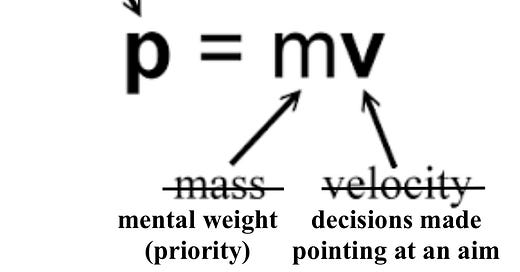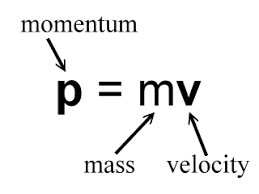
There’s this feeling I’ve had recently that I am just powering through life. Continuously moving forward, getting better, building myself up. I don’t want to slow down, and therefore all of the things that I would have been drawn to in the past—vices, distractions, whatever you want to call anything that adds friction to what you’re doing—feel obsolete, irrelevant and entirely un-intriguing. They simply do not feel worth it. Fittingly, that’s the thing about forward momentum: once it gets started, it maintains itself.
The equation for momentum (p) is (m)*(v)—momentum equals mass times velocity:
Allow me to draw an analogy here, because (1) it’s going to be helpful and (2) I promised my parents I’d actually use my engineering degree one day, so here we go.
My thesis is that the physical momentum this equation represents is analogous to psychological momentum. Consider that (p) represents the momentum we build towards a new habit, relationship, goal, or general destination we’ve defined for ourselves internally. The more mental weight we put behind it (i.e. the higher it ranks in our priorities), and the faster we go (the more of the decisions we make in alignment with that priority), the more momentum we have. Once we get rolling, the momentum maintains itself. Velocity is constant. Without an opposing force applied, it will just keep going in the direction and at the speed it’s been set to.
We haven’t talked about the directional aspect of momentum yet, though. If momentum was an absolute value (i.e. direction didn’t matter), just making something a priority and doing the things that priority asks of you (i.e. harnessing mass and speed) would be enough. But critically, velocity breaks down to both speed and direction. Meaning that if you want to build momentum in the direction of a goal, you need to ensure you are oriented in the right direction. For example, people often try to prioritize “going to the gym” but because this is un-specific and hard to measure, they might go in circles without feeling like they’re making progress and eventually let this habit fizzle out.
This brings me to my core thesis on momentum: to build momentum meaningfully, one needs a clear and specific aim. If you’re trying to build momentum, but don’t know why, you’ll either go super fast in circles (i.e. you’ll exhaust yourself but go nowhere), or you’ll pick up momentum for a bit, then give up because you’ll think: where the hell am I going with this?
I can identify only a few distinct phases in my life where I felt like I was in a proper flow of forward momentum. Namely, (1) right now, (2) when I was doing competitive gymnastics and juggling school, and (3) when I was working part time, grinding scholarship essays till 2am and keeping up with 10 courses in high school.
Looking back, it didn’t feel like I was suffering during any of these periods, despite working probably harder than I had worked on almost anything else until that time. In fact, it was the opposite. I felt boundless, powerful, free, confident, at peace, determined. I felt like I could do anything and that there was no temptation to waste time.
There’s a unique sense of satisfaction that stems from that feeling of: I don’t have the time or desire for distractions. I am moving too fast, too intensely to even consider them.
That’s the best part of forward momentum—the lack of appeal that distractions hold while you’re in the flow of it. This is worth noting because at the beginning of a momentum building phase, distractions do not feel this way. They are still tempting and seductive then. There isn’t yet the inertia to help you glide past them, so ignoring the distractions requires a decision, an active choice to say: no, I will not succumb to speed bumps or deviations from the direction I am moving in. I am trying to build forward momentum.
This ‘saying no’ sounds easy, trivial, rote. But it’s not. It’s the reason most people aren’t experiencing forward momentum at the moment. Doing the right thing, repeatedly, is actually quite hard. Especially when you’re not yet used to it. As Derek Sivers says:
“If information were the key to success, we’d all be billionaires with abs.”
And he’s right. It’s never been information that we’ve lacked (at least not since the internet was invented), but rather the momentum to keep us on track. And with unlimited information came unlimited distractions—the enemy of forward momentum.
We talk lots about habits, compounding, consistency, but people don’t talk enough about the early phases of building momentum. Yes, I think we know by now that good habits = good, bad habits = bad. But how do we start the positive chain reaction? How do we actually ramp up velocity in the right direction and speed, and put sufficient mental weight behind it (i.e. how do we set ourselves up for forward momentum)?
From what I’ve seen, the easiest way to build momentum is by having a very specific aim (fixating on direction first). When you have somewhere you can anchor your momentum to, it feels like there’s a reason you’re speeding up. For example, my friend (a legend and a beast) is doing her residency in medical school now, which requires multiple 24 hour call shifts weekly and generally obscene hours and workload. She’s also training for a half marathon. She told me that she has never been more consistent with running, because she knows she simply *has* to do it or she will get obliterated on the day she has to do it. She admitted that she wouldn’t be showing up as often or as intensely without this clear destination in mind.
I’ve felt this too. My consistency at the gym has been the best it’s been in years. Why? Because I’m trying to improve my handstand—I want to get to 45 seconds standing still in handstand so I practice every time I am there. And while I only spend <5 minutes doing handstands when I’m at the gym at the end of my work outs, there’s something about knowing that I’m not going to reach that goal if I don’t show up at all that gets me there for the remaining 60+ minutes consistently. It triggers the momentum, and it makes the other stuff easier to do. The same goes for writing these 1,000 words every day. I show up and get it done because I don’t want to break my streak. The goal itself means something to me. There are stakes attached to it. Stakes that are entirely self imposed and fairly arbitrary, but stakes that mean something to me, personally.
And that’s the key to ramping up momentum: defining a specific destination with personal stakes attached to it. In short: it’s hard to build momentum when you have no clue why you’re building it.
This relates back to my thesis on discipline and freedom. Sure, discipline yourself to smithereens if you want, but make sure you know why. Otherwise, it will become aimlessly obsessive, or you’ll give up because you’ll remember: oh yeah, I have no reason to do this. Might as well go back to doing whatever feels good in the moment.
Setting an aim, as far as I can tell, seems to be the most reliable way to kick start the most challenging part of being in a flow of forward momentum: initiating it.
The start-and-stop nature of ‘working on yourself’ is very natural—we feel the urge to be better so we fire up good habits and then try to maintain them. But without a North Star for that momentum—no matter how trivial it is—it becomes difficult to see the point in keeping it up at all. Like with most modes of self-improvement and building things in general, it’s simple but not easy:

If you want to build momentum, set an aim (choose a direction), apply mental weight by making it a priority (decide on its mass), and make decisions that align with that priority (pick up speed).
Because no matter how unique and special we are, sometimes it really is the most simple equations that solve the most personal problems. Building momentum is hard for everyone, but understanding the equation to plug your variables into makes it much easier.
See mom and dad? I’m putting that iron ring to use :).
Do you resonate with what I write about? Maybe we should work together: If you resonate with the ideas I write about and want to cultivate a life you genuinely enjoy living, where you align your actions with your values, move towards the changes you know you want to make, and consciously harvest self-knowledge in the process, send an email to isabel@mindmine.school or DM me on Twitter to explore what working together 1-1 would look like.
PS— You can find more of my thoughts on Twitter, and you might enjoy reading my essay about getting into your zone of genius next.






Great piece👊
Great article thanks.
Definitely PURPOSE or WHY is important, then HABIT which is about HOW you keep something going.
The early days of momentum are indeed important so that you simply gain that launch velocity.
The piece you are probably missing is RESILIENCE. At some point, something will come along that will knock you off course regardless of how much momentum you have. Unfortunately, the older you get the more likely this becomes. When that time does come, you will need resilience to stay on course or recover your momentum and go again. That can be the toughest part.